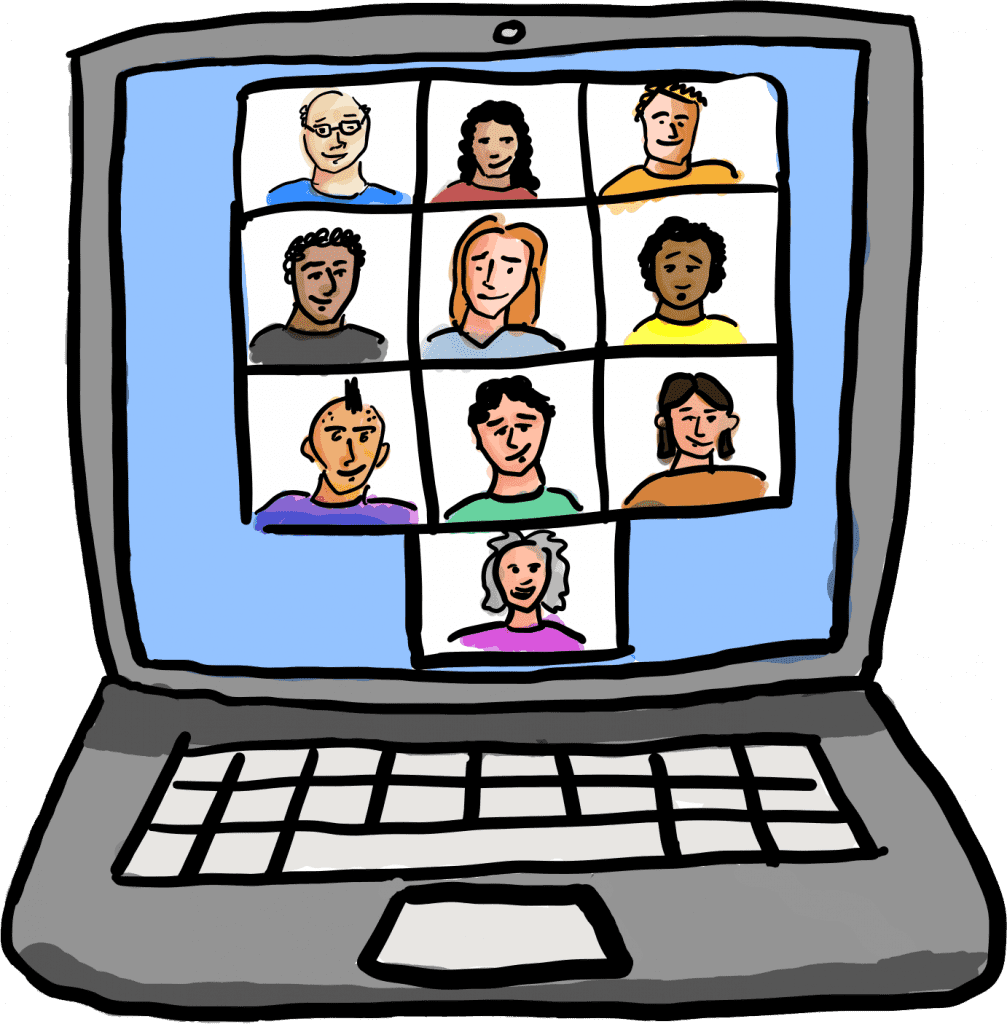
In the debut of the Making Waves blog, join creative epilepsy support group members to learn how they help each other and others through sharing and writing.
Navigating Epilepsy Together is a virtual writing support group formed in 2023 by Yarrow Rubin. Each session features a discussion topic and writing prompts based on the group discussion.
In April 2024, the group interviewed each other about their experiences in Epilepsy support groups. They prepared interview questions in advance and each attendee took turns choosing a question. Yarrow picked names out of a vintage green cup to establish a random order. Below is the transcript of the group interview,* edited for readability and brevity while preserving the participant’s authentic voices.
We hope you enjoy this account of power and connection that takes place in support groups like this.
| Martha | Yarrow, epilepsy is a medical condition. How is epilepsy a social condition? | ||
| Yarrow Rubin |  For me it is a social condition in every way, but to keep it brief, I’ll share just this issue; I was a young adult when I had my first seizure. It was after a Halloween party where I’d had two alcohol drinks. And I quickly realized, socializing in an atmosphere with alcohol, that drinking was not going to be something that I could do easily if I wanted to stay seizure free. So, in social situations with alcohol drinking and/or even just wine at dinner, I had to choose not to partake so I could keep myself safe. This has had a huge impact on my life. Obviously, in a lot of positive ways, I should say. But it’s been a challenge to navigate. For me it is a social condition in every way, but to keep it brief, I’ll share just this issue; I was a young adult when I had my first seizure. It was after a Halloween party where I’d had two alcohol drinks. And I quickly realized, socializing in an atmosphere with alcohol, that drinking was not going to be something that I could do easily if I wanted to stay seizure free. So, in social situations with alcohol drinking and/or even just wine at dinner, I had to choose not to partake so I could keep myself safe. This has had a huge impact on my life. Obviously, in a lot of positive ways, I should say. But it’s been a challenge to navigate. |
||
| Yarrow | V, What commonalities with other people with epilepsy have most surprised you? | ||
| V | Growing up with epilepsy I was always trying to hide my condition. I wasn’t in a rush to find or experience any commonalities within my social life. Finally accepting my epilepsy, I’ve been able to help and host epilepsy support groups. I’m currently on a pathway, pursuing ideas to spread epilepsy awareness. I ask myself, is spreading epilepsy awareness my goal in life? | ||
| V | Laura, what motivated you to join the epilepsy support group? And how has your experience been so far? | ||
| Laura |
When my youngest child moved away last year, I planned to focus on my health. My seizures had increased over the previous year and my driver’s license was taken away. My new neurologist confirmed my epilepsy diagnosis and suggested a support group. Since first being diagnosed in 2004, I haven’t spoken to anyone else with epilepsy. But Dr. Shih, my new neurologist at UCSF, emphasized taking my condition seriously. Though my seizures are minor, they disrupt my daily life, causing me to slow down, lose language, and sometimes just blink out. My kids often noticed and asked if I took my medication. I joined the support group and it was the first time I openly acknowledged my epilepsy and met others with the condition. It has been an essential part of my journey, providing education and leading to further tests like an MRI to understand my epilepsy better. I’m grateful for the support group. | ||
| Laura | Maralou, who is the first person you ever met who also had epilepsy? And how did your body react to meeting them? | ||
| Maralou | Well, I’m kind of going to have a short answer to this, because I have not met anyone in person who was an adult who said they had epilepsy. The closest I have gotten to this is talking to so many people in the support groups. I’m hoping to meet someone in person one day, but I haven’t done that yet. Of course, I have mostly been at home for the last ten years and haven’t met that many new people in person. When the pandemic started, I learned to use Zoom and started “meeting” a lot more people. I feel like I have three new groups of friends now. They all have epilepsy. I can’t say my body had any reaction because everyone has been on the other side of the screen, but my mind has had a reaction to having all these friends! There is a lot less stress in my life because of knowing all these supportive people! | ||
| Maralou | Alisa, what advice would you give to someone considering joining an epilepsy support group for the first time? | ||
| Alisa | What advice would I give a newcomer? Well, this is my first support group. Actually, I’ve been in two others, one for work stress, which was causing my seizures. And then a generalized anxiety group. If I were giving advice to a person who was joining an epilepsy group for the first time, I would say, “Come curious!’ And be ready for a vast spectrum of stories, because seizures manifest in such different ways for all people and people have such broad experiences that you will see people who are new to it, and people who have dealt with seizures their entire life. That can be incredibly instructive for you. Or you might meet people with triggers that resonate with your triggers. And suddenly you’ll see things that you hadn’t seen before or you’ll learn of resources like different emergency medications that you’ll want to ask your doctor about, and/or ways that you can participate and find resources for, say, getting a job, like for firms who specifically focus on people with epilepsy. | ||
 And next, there’s a whole wealth of connection, but also the new possibilities you’re opening yourself up to that you wouldn’t have known about. I’m not a big joiner of groups because I usually have work deadlines. But my publicist, when I was working on my book, nudged me to join an epilepsy support group to understand more of what other people were going through. Because when you’re writing a memoir like I am, it’s not a ME-moir, it’s a WE-moir. You gotta get the “we” in there. And if you’re not resonating and if you’re not understanding, and if you’re not connecting with your community, you’re just missing out on a whole set of experiences that could be part of making your life richer and better and more possible. Because epilepsy is a hard, hard thing to go through. So why go through it alone? And next, there’s a whole wealth of connection, but also the new possibilities you’re opening yourself up to that you wouldn’t have known about. I’m not a big joiner of groups because I usually have work deadlines. But my publicist, when I was working on my book, nudged me to join an epilepsy support group to understand more of what other people were going through. Because when you’re writing a memoir like I am, it’s not a ME-moir, it’s a WE-moir. You gotta get the “we” in there. And if you’re not resonating and if you’re not understanding, and if you’re not connecting with your community, you’re just missing out on a whole set of experiences that could be part of making your life richer and better and more possible. Because epilepsy is a hard, hard thing to go through. So why go through it alone? |
|||
| Alisa | Amanda, what connection with others with epilepsy makes daily life easier? Because that’s a big thing that I grapple with, so I’d love to know. | ||
| Amanda | Well, I’m in the support group, also, and art therapy. And we have texts that we do with each other and you kinda know how each other is doing, and it helps you know that you’re not alone in the journey you’re on. And that I have friends in the support groups that will reach out and ask questions. | ||
| Amanda | Chris, what are your hopes for the future of the epilepsy support group? And how do you envision it, continuing to make a positive impact on members’ lives? | ||
| Chris | So I don’t know what in terms of this support group. I honestly wouldn’t want to change it in that sense. I like everywhere it’s been going organically and with everyone’s input. There may be a couple of things I could say, but there’s not much in terms of the structure I’d change. I dig it! I think there are issues with how people in general talk about epilepsy awareness. About how with different organizations or in the media or on social media, you hear more from North Americans and British people. And, of course, there are epileptics or people with epilepsy everywhere. Basically, epileptics internationally! About 80% of the people in the world are in the Global South and they’re often excluded from the dialogue. So, if we’re trying to raise awareness or have those groups connect and raise epilepsy awareness, I think it’s important to include everyone. Ideally, we have to provide them with a way to share their own voices. But we are the ones who can speak — not them — about us, right? I think that’s also something. I don’t know how that’s going to happen. I can say stuff like this and hope magically. But that’s a big issue, I think, for me. Thanks. Great question. | ||
| Chris | Amber, how does this support group foster a sense of community and connection among its members? Especially considering the often isolating nature of epilepsy. | ||
| Amber | When I first got diagnosed with seizures, the first thing I wanted to do was to join a support group. So, I just typed in support groups near me. And that’s how I found you guys, in terms of connecting with others who are going through the same thing I’m going through. And now I’m a regular! | ||
| Amber | Martha, in what ways has the support group helped you to navigate challenges related to epilepsy, such as stigma, medication adjustment, or lifestyle change adjustments? | ||
| Martha | Well, I mean, just having other people who are going through the same thing. Having people who I can talk to who actually know what I’m going through because they’re going through it, too. Having their support is like extra encouragement when dealing with those challenges. It’s like, okay, I can do this, other people are doing it. I can totally do this! | ||
| Philip | Thank you for giving me the chance to participate in the interview via email. I am responding to the first interview question: “What motivated you to join the epilepsy support group, and how has your experience been so far?” | ||
 I heard about the Writing Group through the Art Group which I attended last November. I was almost instantly motivated to join because I have already been writing my personal thoughts in journals for years. I also record vivid dreams that I still remember after waking up, often writing daily. My experience with the Writing Group has been wonderful. Although I often have myself muted and hidden, I enjoy listening to these conversations, which can give me further inspiration and ideas. It is lots of fun to hear different kinds of opinions here about subjects. However, with three heavy medications that cause weariness, they conflict with the early meeting time and I am not regularly able to join on time. But I always enjoy any moment of the writing group I attend. I heard about the Writing Group through the Art Group which I attended last November. I was almost instantly motivated to join because I have already been writing my personal thoughts in journals for years. I also record vivid dreams that I still remember after waking up, often writing daily. My experience with the Writing Group has been wonderful. Although I often have myself muted and hidden, I enjoy listening to these conversations, which can give me further inspiration and ideas. It is lots of fun to hear different kinds of opinions here about subjects. However, with three heavy medications that cause weariness, they conflict with the early meeting time and I am not regularly able to join on time. But I always enjoy any moment of the writing group I attend. |
|||
| Yarrow | Thanks, Philip. And one more question. This one’s for Alisa:
Alisa, what is it like to have a support group, a writing group, only for epileptics, people with epilepsy, facilitated by a person with epilepsy, and without doctors or caregivers? |
||
| Alisa | Oh, it’s freeing, because other people are so controlling about your behaviors, and they get so on you about, “Are you managing your triggers?” that it can feel so claustrophobic. And, so, to have this outlet — even if it’s your morning pages or your journal — can be just such a tremendous release. | ||
 |
|||
